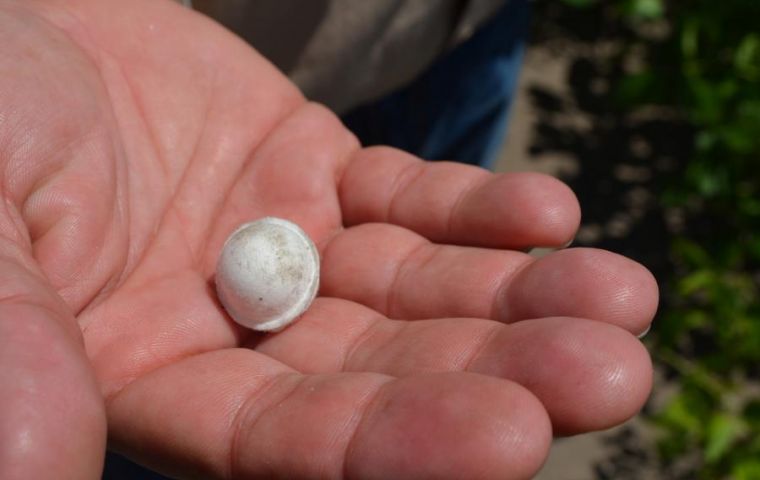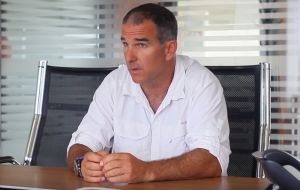MercoPress. South Atlantic News Agency
Instead of agrochemicals, Uruguay uses wasps to develop non-genetically modified soy
 Uruguayan producers plan to ship non-genetically modified, agrochemical-free soy to China for human consumption.
Uruguayan producers plan to ship non-genetically modified, agrochemical-free soy to China for human consumption.  Now Uruguay, with 11,000 hectares of non-GMO soy planted, is positioning as a premium provider of non-GMO soy due to a project that involves wasp eggs as a natural pest fighter.
Now Uruguay, with 11,000 hectares of non-GMO soy planted, is positioning as a premium provider of non-GMO soy due to a project that involves wasp eggs as a natural pest fighter.  “The function of the objective is to continue increasing according to the demand,” Diego Meikle told Dialogo Chino
“The function of the objective is to continue increasing according to the demand,” Diego Meikle told Dialogo Chino In Uruguay, non-genetically modified soy (GMO) soy is being developed in order to compete in a market saturated by the volume of crops in the region. Nevertheless, the country’s government hopes Uruguayan soy will stand out for its quality rather than for the volume of harvests motivating soy producers to use “biological controls” to combat pests.
Producers plan to ship non-genetically modified, agrochemical-free soy to China for human consumption. China imports around 90 million tonnes of GMO soy each year and consumes 15 million tonnes of non-GMO soybeans, most of it produced in the country.
GMO soy is used by China, the main buyer of Uruguayan soy crops, to feed pigs and chickens. Soy is Uruguay’s main crop. The country has planted one million hectares of genetically modified soy (GMO).
Now the South American country, with 11,000 hectares of non-GMO soy planted, is positioning as a premium provider of non-GMO soy due to a project that involves wasp eggs as a natural pest fighter so as to provide soybean for human consumption.
Uruguayan researchers have adapted the machinery to release capsules containing wasp eggs, which on hatching will fight pests and reduce the need to use agrochemicals. They are deployed on a field planted with non-genetically modified soy with a machine known as “Mosquito” that moves through a green soy field.
Mosquito’s giant arms, which stretch out like the wings of an insect, were designed to spray chemicals on the crop. But now they have a different function disseminating a small wasp less than half a millimeter in an artificial egg to control a larva that affects sugar cane. César Basso, a professor at the University of Uruguay, investigated the process.
This process is non-toxic but it does require costly, dedicated laboratories.
Seeking expansion
The Uruguayan government expects the country to make its first shipment of non-GMO soy to China this year, a possibility that has been years in the making, Enzo Benech, Uruguay’s minister for Livestock Agriculture and Fisheries (MGAP) said.
The introduction of wasps in the cultivation of soybeans helps combat plagues of crop-munching caterpillars. French company Bioline joined the project years ago and carried out tests on 1,800 hectares of non-GMO soybeans. The practice could extend to GMO crops.
Basso said the results are very encouraging and hopes to expand cultivation using the technique. Barraca Erro, the only non-GMO soy producer in Uruguay, wants to continue with the experiment.
Diego Meikle, Barraca Erro’s non-GMO project leader, told Diálogo Chino that the project is being prompted in the field for 4 years now. Regarding the figure of 11,000 non-GMO hectares production, “the function of the objective is to continue increasing according to the demand.”
Safe for human consumption
There are many reviews and official statements about the safety of foods from genetically modified crops, as this paper documents.
The question of whether GMO soy is safe for human consumption has been especially controversial in China, where massive national demand deserves a higher volume of crops.
“In recent years, China’s top scientific, medical and military medical research institutes have come to the conclusion that GMO soy is unsafe,” Chinese paper Heilongjiang Daily published in October.
National media questioned its veracity. Yet, as uncertainty over its safety continues, non-GMO soy dominates the domestic food market.
Nevertheless, Uruguay figures as a reliable provider. For Diego Montes, general director of Agricultural Services at MGAP, traceability of soybeans “from sowing to shipping” is a key element in the quest for quality, something that the country has experience with as its meat industry traces cows from pasture to plate.




Top Comments
Disclaimer & comment rulesCommenting for this story is now closed.
If you have a Facebook account, become a fan and comment on our Facebook Page!